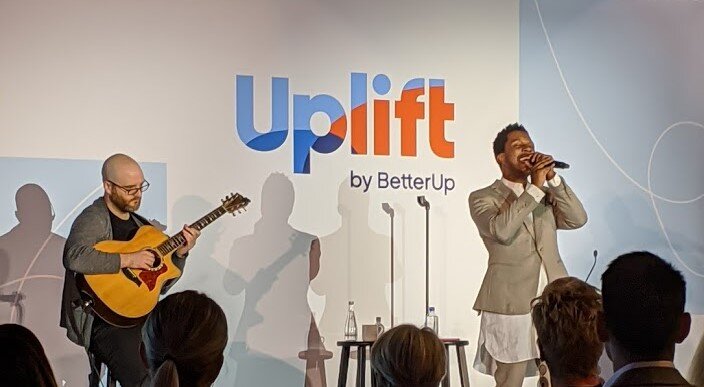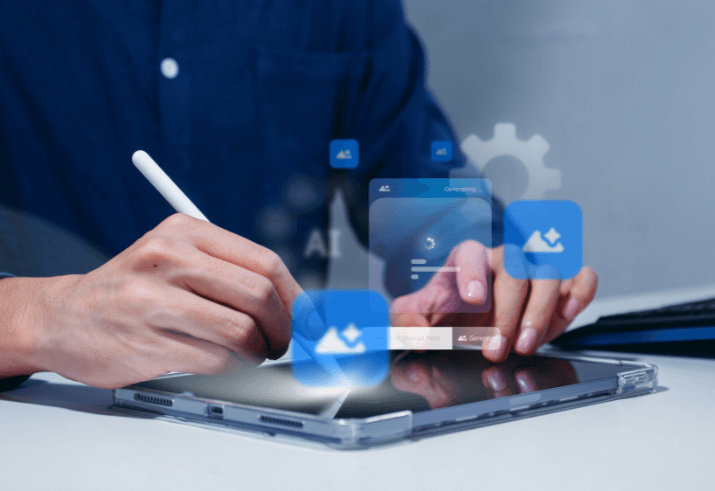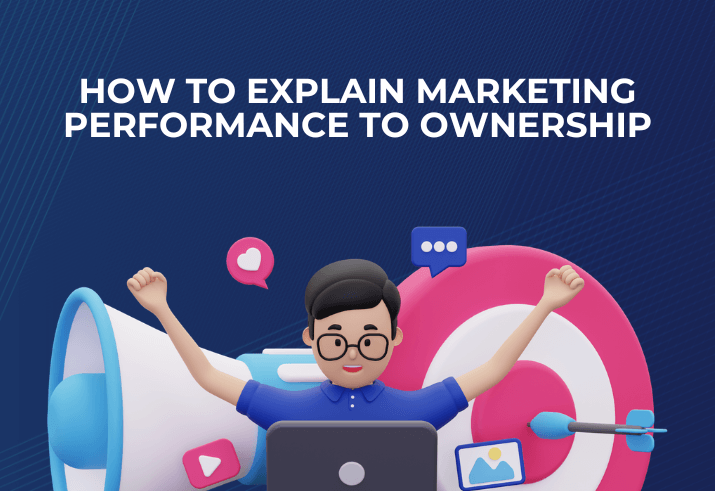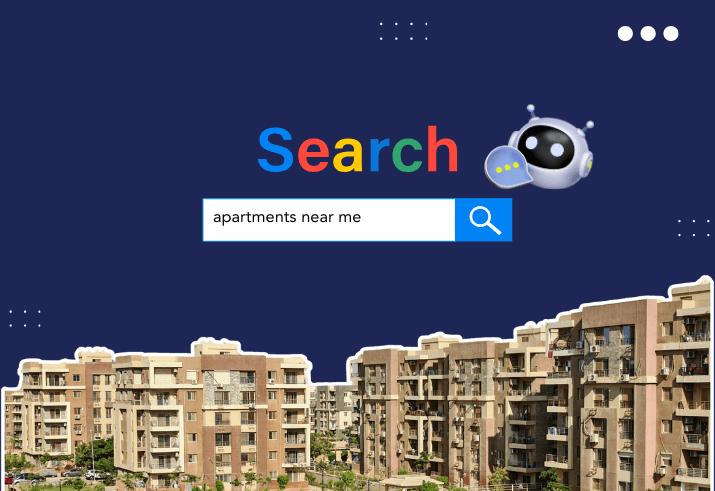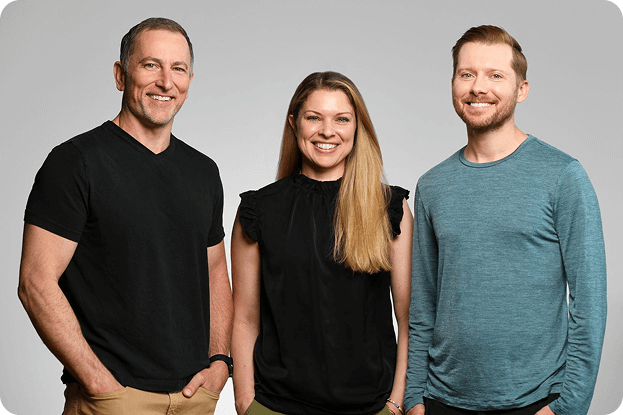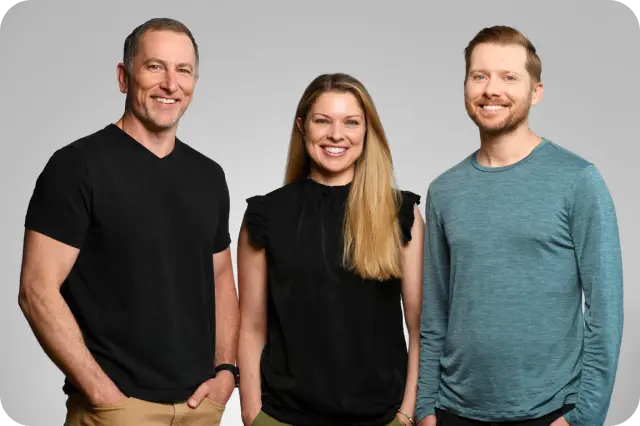
Thriving in a White Water World of Work
[00:00:00] David Staley: All right. It’s David from the digital dudes podcast
[00:00:02] Nicole Brennan: and I’m Nicole.
[00:00:03]David Staley: And we are here reporting from the, uh, better.
[00:00:09] Nicole Brennan: We are at the uplift 2020 conference hosted by
[00:00:12] BetterUp
[00:00:13]David Staley: And what is the conference about? What, what are we doing here?
[00:00:16] Nicole Brennan: So we are talking about employee experience, leadership and development and what it means to be thriving.
[00:00:22] Any whitewater world of work. Say that 10 times fast.
[00:00:26] David Staley: Yeah. Well, that was the, uh, the poor MC. I guess she’s, she’s struggled busing through that constantly. Um,
[00:00:35] Nicole Brennan: and we are in Berkeley, California right now. So it’s our first remote podcast.
[00:00:38] David Staley: That’s right. It is, yeah. First time. First time on, on a scene. And this is, uh, we just finished a one.
[00:00:45] And we’re heading into day two, or maybe they call it day three of the conference cause there
[00:00:49] Nicole Brennan: It was a half day on Monday.
[00:00:51] David Staley: Yeah. Yeah. Uh, so this, in this episode we’re going to talk about, uh, what the heck is better up? Never heard of it before. [00:01:00] Let’s cover that. What is UpLift? It’s BetterUp’s their first conference and what are we trying to do?
[00:01:04] Like what, what was the purpose of us being here and what’s been our experience from a high level? Um, but let’s give people a quick tip or preview from one of the things that you learn so. One of the things that, that they hammered was gratitude. You have to be, you have to be, well, quick theme. They’re like, if you’re not, um, if you’re not, if you’re always negative, then you’re going to be in this negative mindset.
[00:01:29] And so you have to reinforce the positive mindset for you to then be happy individual and start to like that to spread through. So then they recommend that each day you. Say three things that you’re grateful for.
[00:01:41] Nicole Brennan: Yeah. I think we’ll get into this on the session where we do a deep dive on it, but it was fascinating to just learn about how your brain processes information.
[00:01:49] So it’s not necessarily about just saying what you’re grateful for. It’s about reinforcing the habit of your brain scanning for positive experiences.
[00:01:58] David Staley: So that was cool. So I wanted to [00:02:00] give one the most significant thing that’s happened in our marriage this far. Is that you have given me your last Yogi Vanilla Energy tea.
[00:02:10] Nicole Brennan: That’s right. I brought them all the way from Colorado. I was stacked them up in my bag. I had one left for the entire day and I gave it to you this morning.
[00:02:19] David Staley: I know. It’s fueling me. Well, the the reason is the tea here at this hotel is terrific. I, A-Plus. However, what’s not a plus is it’s basically Earl gray everywhere.
[00:02:32] They love their Earl Grey. Some folks know I cannot deal with Earl Grey. I’m all about that English Breakfast or black tea that bergamot oil just cannot do. So you saved me. Eight o’clock in the morning and you give me your vanilla spice and you let me know it too. Just so you know, I have a problem giving this to you.
[00:02:53] And I was like, I’ll suffer. And you’re like, no, no, no. You need to be grateful for something. Here’s my teeth. So [00:03:00] I’m grateful.
[00:03:00] Nicole Brennan: Well, I’m grateful. You’re grateful because I didn’t want it to, you know, not to hit you because it was a big deal.
[00:03:08] David Staley: So there you go. I mean, a positive mindset.
[00:03:11] Nicole Brennan: All right, let’s
[00:03:12] David Staley: do it.
[00:03:12] All right. See you on the other side.
[00:03:14] Okay, Nicole. So here we are.
[00:03:33] Nicole Brennan: Here we are. We’re at the Claremont hotel and spa club and saw actually in Berkeley, California.
[00:03:40] David Staley: If only it was the Fairmont. I was joking. It is the Fairmont. Which I guess is a brand.
[00:03:51] Nicole Brennan: Yeah, so this is actually a historic hotel. I don’t know if you knew that.
[00:03:54] It’s built in 1915.
[00:03:59] David Staley: Three years [00:04:00] after the Titanic.
[00:04:01] Nicole Brennan: A lot
[00:04:02] David Staley: of pictures around the walls actually makes sense. It looks they have like this Titanic, like pictures.
[00:04:07] Nicole Brennan: Yeah. Lot of kind of progress photos throughout the years. It seems like a lot of the original structure and architect is still intact.
[00:04:16] Meaning it didn’t like completely renovate the outside, which is nice.
[00:04:19] David Staley: Should say a Claremont hotel in Berkeley. Yeah, right. I mean, it’s basically Oakland, but Berkeley. So outside San Francisco. All right. What are we here for?
[00:04:30] Nicole Brennan: So we are at a conference called uplift and it’s put on by a company called better up, and it is a leadership and employee experience conference.
[00:04:40] Um, but the whole theme is thriving in a whitewater world of work. So I think maybe before we get into that, do you want to give an overview of BetterUp how you found them and how we at digital are utilizing their services.
[00:04:53] David Staley: Yeah. Um, so better up. I can’t, I mean, I don’t know how I find these things, but, um, we [00:05:00] were a growing company or are growing company, right.
[00:05:03] When, when we, um, we joined with them maybe six months or so ago, or maybe more than that in more than six months.
[00:05:10] Nicole Brennan: So we’ve been talking to them for awhile. I think I’ve officially been on the platform for, I want to say four months.
[00:05:16] David Staley: That’s it. I think so. Huh? It seems like longer. Well, anyways, their, their whole deal is being able to bring coaches, like give a professional coach to everybody in their pocket.
[00:05:27] And so they, they look to, they have a platform, as Nicole said, that software base that helps a match, kind of like a dating profile where it’ll match a, um, an employee with a, um. With the coach and the coach could be anywhere in the world, but it’s just basically the process. You go, you went through, maybe you should describe
[00:05:46] Nicole Brennan: that
[00:05:47] David Staley: more.
[00:05:48] Nicole Brennan: So, um, the platform is super, super slick. They’re a technology company. Um, all of their coaching is done remotely. So you have an app on your phone and you do video sessions with your [00:06:00] coach, you scheduled through the platform. Um, but when you first onboard, you take what they call the whole person assessment.
[00:06:06] So that just judges kind of. Six different themes of the employee experience and what you want to focus on, where you’re strong, maybe where you’re a little bit weaker. Um, and they all believe in this strengths-based coaching philosophy, meaning how do you use your strengths to address some of your weaker points, but then also really, really focusing on your strengths.
[00:06:27] So not saying we’re not going to address the weaknesses, but really how can you can focus on your strength to succeed in both your personal and professional life?
[00:06:36] David Staley: That was awesome. But beyond whole person or by whole person, you mean that they make sure that you’re a healthy individual?
[00:06:42] Nicole Brennan: Correct. Yeah. So it’s really focused on both your personal and professional life.
[00:06:46] So there’s questions about work life balance, how healthy do you eat? What’s your workout routine like? Um, so really making sure that your whole. For lack of a better word, I’ll keep saying whole person, but you know, your, every [00:07:00] aspect of your life is healthy. Um, and that will help you thrive also at work.
[00:07:04] David Staley: Yeah. Meaning they, they believe you can’t work on your professional life if your personal life is in tatters in a way. I mean, it’s, I don’t, I don’t know if I’d say it’s like if you were in like an emergency personal crisis or something, would you still go through them or would you find, would that require
[00:07:20] Nicole Brennan: someone else?
[00:07:23] Mmm. It’s interesting. I think it really depends on your coach. So once you take the whole person assessment and you get shown different coaching options that they think are gonna mesh well with your skills and what you’ve identified. So you can choose someone who maybe is more, um, you know, maybe someone who has been in the freshmen world for awhile.
[00:07:45] Like depending on what you want, right? So if you want someone who’s like, been there, done that, maybe they have 20 years of leadership. Skills at a very large organization, and now they’re doing coaching and they can draw on that past experience. Or you can choose someone who maybe is more on, [00:08:00] um, has a background from therapy and, um, mindfulness, meditation, yoga, some of those types of skills.
[00:08:09] So I think it really is up to you how you utilize the platform, but I think they’re always going to try and weave. Your success into it. So I think it depends. I don’t, I’m not qualified to say if you should, um, you know, if you’re having a personal emergency, you probably consult your doctor. But I don’t think that’s really the, the main like core competency.
[00:08:29] David Staley: Well, so they get through these personal things, make sure that you have your work life balance figured out and all this other stuff so that you feel healthy personally. And then you move on to the professional stuff. And what’s interesting about is it’s not just. I mean, it’s, it’s super full. Fill out the platform, meaning it’s not like, Oh, sweet.
[00:08:48] A scheduling platform for a coach. So you take this crazy assessment, you get offered three coaches, um, you pick from one of those three coaches based on their bio or the video they have, and then you go with it. They said that their [00:09:00] match rate on those three coaches is 98%. Which seems true, I guess like from our small sample size, we have like four or five people on the platform and they, they all like seem to love their coaches.
[00:09:11] Nicole Brennan: Yeah. They’re also super flexible, so you can change your coach at any time, so you don’t, you’re not like stuck with someone. But I think everyone that we have, the four of us have stuck with our original coach. Um, but they seem to encourage it like, Hey, you know, if you want a different perspective or just.
[00:09:26] To connect with someone who has a different style, and they just seem really open to that
[00:09:30] David Staley: flexibility. And then, um, what’s interesting about it is it’s not, again, just a matchmaking service, but they track you over time to show how your strengths and weaknesses have changed. Um, if you have enough people in the platform, they’ll help, uh, they use their data science algorithms to say, here’s how the culture of your company has evolved.
[00:09:51] Over time, we don’t have enough people in the platform to do, to really take full advantage of that, but there is quite a bit of data and data visualizations that we can see tied to more of the, I’ll [00:10:00] say, the soft part of employees, uh, for us. The power skills. Yeah. So one of the things that this conference, they said they want to remove the word soft, soft skills and then go to power skills because they’re the hard, hard skills.
[00:10:13] Um, so they, uh, the reason we got on it was as a, as a growing company, we are, I felt personally, this is maybe for my own peace of mind that, uh, we didn’t have, we don’t have the opportunity to mess up. So we were, um, at times hiring and growing a lot of leaders. And if. It, you know, if it takes six months or a year to figure out that someone’s not going to be a good leader or that they need certain coaching, that’s a long time in the life of a startup and that’s a lot of risk.
[00:10:43] And so for, for me, I know that I’m not necessarily always the best coach, coach, or mentor for someone. Self read, like nobody at the company is going to be the perfect coach or mentor for somebody. And so the reason I
[00:10:55] Nicole Brennan: have the time, right? Cause I mean we’re moving so fast and um, one of [00:11:00] the great things about better up, or at least the platform or package that we are on, is that you can have unlimited sessions.
[00:11:05] So you can do, you know, two hours a week if you want it. And I think most of us are doing, um, one session either every week or every other week and having a longer session. So it’s really that time and frequency that I think also really helps.
[00:11:17] David Staley: Right. So then, uh, that gave me the peace of mind that even if we miss someone’s one-on-one or were, or, or what have you, they were still, we had backup.
[00:11:27] We had a, um, an insurance policy option that somebody was working on, on these skills with, uh, with our leadership team. And, um, the employee gets to say what they want to work on, but also the company, it gets to tell, uh, say, here’s what’s, here’s what’s important about our values. And so even if there’s not great self awareness of the person on the platform.
[00:11:47] You as the company can say, here’s the values of the company and here’s the things we want people to focus on. Like you mentioned growth mindset. Um, but then the employee can certainly pick their own stuff. Look, I just pulled a read and had my [00:12:00] phone on.
[00:12:00] Nicole Brennan: At least it wasn’t my tea cause I got a warning.
[00:12:02] Your mouth, my clinking
[00:12:03] David Staley: cups. I’m clean claim. Um, all right. So anything else about maybe the, the better up program? Well, I mean I have one more thing, but anything else you want to mention about it before we talk about the conference?
[00:12:17] Nicole Brennan: I feel like I could talk about it forever. Um, I think another thing that’s really cool is that it’s a way to get feedback.
[00:12:24] So when I first joined, um, Reed was able to fill out, like feedback for me, right? Early on. And then a few months ago we did three 60 feedback where, you know, my peers and my employees also filled out, um, questionnaire about me and, you know, just their experience working me with me, things I could improve on.
[00:12:43] Um, and then. Didn’t you
[00:12:45] David Staley: do it for Reed too, and he’s not on the platform? Yeah. We
[00:12:48] Nicole Brennan: just kinda took, we took the questionnaire and like did it our own way. Um, but I think their questions are really thoughtful, so I really liked that aspect of it. It’s not just. You’re doing it in a silo, you can bring, you [00:13:00] know, people from the organization into like skills that you’re working on.
[00:13:04] And then they release the new features at the conference, which made me, we’ll hold on cause you’ll probably want to talk through that I think could be really cool for us.
[00:13:11] David Staley: Yeah. The, I guess what’s also nice about the, about from the admin perspective is there’s data that’s provided on who’s using the platform.
[00:13:21] What frequently. See what skills they’ve worked on. Um, but certainly there’s some client privilege things there where we can’t see the notes from the session unless you guys were to release them to us. Um, but we .
[00:13:36] Nicole Brennan: I don’t know how other people are using it, but I feel like I’m an open book with it and like just talking through like, Hey, here’s what I’m working on.
[00:13:41] Um, so it’s not like you’ll have visibility to my platform, but I often do talk about things that are happening.
[00:13:47] David Staley: Well, it’s part of our value, authenticity and transparency. So, yeah. Um, then the, the coach will also give homework, so they’ll offer, they’ll assign personalized homework, um, like [00:14:00] Ted talks or articles, like based on how you learn.
[00:14:02] Um, and I think that’s really interesting too because this goes back to the big data, but, um, better up has raised what does $120 million,
[00:14:10] Nicole Brennan: $42 million,
[00:14:11] David Staley: 142 million. Um, and they’ve been around seven years and they, uh, you know, have, have, uh, tens of thousands of people on the platform at this point and they’re able to anonymize and bring all that data together and show if you’re working on this skill and you’re this type of individual, here’s the type of content that will resonate with that person.
[00:14:29] And so the coach has. Can help us sign like good contents to the coaches are more efficient too. Yeah. They’re on the platform,
[00:14:34] Nicole Brennan: they’re more efficient and they’re also very responsive. So it’s not just the sessions. You can, um, through the app, text your coach at any time. So if you’re like about to walk into a meeting and you have, you know, you want to do a quick role play, Hey, how should I phrase this conversation I’m about to have?
[00:14:49] Um, they are available more. Um. Just faster than, you don’t have to wait for your session every week. Cause I think that’s also nice.
[00:15:00] [00:14:59] David Staley: Yeah. And so I, if I was listening right now, I’d probably say like, well this sounds great, but it sounds really expensive. Um, or who’s it for? And I guess like that was a big question for read night at the beginning.
[00:15:09] Cause we, we believe in coaching and employee development, but, um, you know, some of Reed’s experience in particular, they can be, you know, quite costly and you have to choose the right individuals. So when better up, when we first got on or start talking to them maybe a year ago before. Uh, before, as you said, you got on the platform, but they were saying, well, this is really good for, um, I w it’s been more than that because we, uh, I talked about that are up a little bit, that the happy hour at the digital summit last year.
[00:15:38] Nicole Brennan: Yeah. Maybe we were still in the vetting phase. It looks like I’ve been on since, no, remember. So maybe a little bit over four months.
[00:15:46] David Staley: Hmm. Well, um, they said it’s for high. What’s that?
[00:15:53] Nicole Brennan: Yeah, we started talking. Yeah, we had, I get started with better men or better, I keep doing that in [00:16:00] August. So it wasn’t on this summit time.
[00:16:01] You’re
[00:16:01] David Staley: totally right. So, um, they said it was for high, high potential individuals and then also for leadership and, um, we, all of our leaders are high potential and obviously
[00:16:15] Nicole Brennan: they’re shifting out a little bit. Um, and I don’t know. I think it’s too much of a, a sales pitch, but I do totally believe in the value of having everyone have access to the platform.
[00:16:27] It seems like at least the people who are at this conference, um, we are definitely on the smaller side of the company.
[00:16:33] David Staley: But like.
[00:16:36] Nicole Brennan: But like, he’ll take your tree. Hilton is here with 420,000 employees. I don’t think they have everyone on that platform, but it really can scale up from startups who have every single employee on the platform to maybe like a Hilton who has their leadership.
[00:16:48] David Staley: Right? We met another company last night at happy hour that had 15 of their 16 people on it. But, um, so back to it, that’s what they said originally. And now they seem to be going more after the angle of [00:17:00] like, everybody deserves this. And they gave the example of like, retail. If you’re a retail shop, like,
[00:17:04] Nicole Brennan: yeah, frontline, um, like really important to have, you know, people who are closest to your customers on the platform.
[00:17:10] Um, because at least at this conference, they’re really tying the employee experience to the customer experience. So that goes into authenticity and being your self at work. So if you’re not having a good experience as an employee, how are you supposed to. Represent the company and have a good experience with the customer.
[00:17:28] So they are tying that all together, which totally connects with me.
[00:17:31] David Staley: And there are a few themes that have come out where they said, um, I hadn’t heard this before, but they said the businesses theater, and they said, in particular, back to your like frontline person, they are, they’re basically an actor of the company.
[00:17:44] The theater as if cause this is theater, meaning that, so to your point, I mean it’s, it’s sort of like a different angle of like every person’s a salesperson.
[00:17:53] Nicole Brennan: Right? Yeah. And he did, um, give that example of which I did love, but did also qualify it by [00:18:00] saying like, not acting, meaning like I’m being inauthentic, but really all forms of acting or just choosing which part of yourself to show up that day.
[00:18:09] So really being connected with those qualities that you need to be your best in the work environment.
[00:18:15] David Staley: Maybe I choose my pajama shell self to show up today.
[00:18:18] Nicole Brennan: Sometimes you do. I feel
[00:18:21] David Staley: well. Um, so at this, uh, at this conference then, the reason it’s their first one that they’re putting on, they invited, well, we got an invite, which I wasn’t sure if it was like a mass invite across the board.
[00:18:34] Our tickets were comped, cause I’m not even sure if if they were charging for it, but there are a lot of, I’ll say. That’s it. I don’t want to say high end, I don’t know, significant companies here. I don’t know the way you phrase it, but like there’s really big players that are here and very, I’ll say like industry folks that are super important in any [00:19:00] industry and in particular like the HR and employee growth industries.
[00:19:04] Um, I sort of felt like a fish out of water. Normally go to conferences. I’m like, all right, cool. And this is the one where I feel like the new, it’s like,
[00:19:13] Nicole Brennan: yeah, I don’t know if you want to get into that, but it’s been really nice. The first session I was like, wouldn’t it be cool if we just went to a conference once per year just completely out of our industry.
[00:19:22] I mean, this definitely ties back to what we’re doing and it’s super important for us. Um, but like I give the example, like healthcare or auto, it’s like, you’ll just learn so much by being. Not the expert in the room. Um, so I think that’s been cool for us to actually also attend a conference. Um, we’re usually usually like hosting or at the booth or you know, on the vendor side.
[00:19:44] So this has been really nice to absorb and learn from the content.
[00:19:48] David Staley: Yeah. Yeah. I mean it’s like at first, at the first night of happy hour, I thought, wow, is this, cause they kept saying HR and I was like, Oh shoot, is this an HR conference? And [00:20:00] we didn’t understand. Cause the way it was positioned to us is more of like.
[00:20:03] A growth conference.
[00:20:04] Nicole Brennan: Well, I do want to get into that. Um, so I’ll let you kind of finish that thread. But yeah, so the first night they did keep saying HR, L and D, learning and development. Like
[00:20:14] David Staley: I picked that up quick. I was like, yo, they got it on top of it. And the employee experience, I must have Googled employee experience like 11 times at this point.
[00:20:23] Yeah. I mean, cause it’s like they bring it up and they call it . And it sounds like it makes sense, but then all of the metrics that, that ties to it and how they’re measuring employee experience kept confusing me.
[00:20:34] Nicole Brennan: I feel like it was pretty clear
[00:20:35] David Staley: for me. All right. Go for it.
[00:20:38] Nicole Brennan: So they had talked about, um, in their survey, I’m don’t quote me on this number.
[00:20:44] I mean, I know for sure it was over 20,000, um, participants from this research perspective, what they had identified 160 qualities that go into, you. Someone’s employee experience. Um, basically judging, I took it as how that [00:21:00] overall, that employee’s overall happiness, their experience at work, like their value, almost like their net promoter score of the company from that 160.
[00:21:09] Those 160 quality if they narrowed it down to six that are really important.
[00:21:12] David Staley: So those are six they kept talking
[00:21:14] Nicole Brennan: through. So I think we’ll get into that. But that’s kinda
[00:21:17] David Staley: the foundation of their platform, correct? Right. Yeah. I guess, well let’s, we can jump in a little bit now, but I, that’s where I got a little bit, um, hung up on like their score, cause they talk about what improves employee experience by like 22 points.
[00:21:32] But it wasn’t like a percentage. It was like a point. So I didn’t understand like how big the scale was. Um, and they talked about like the factors that mattered and didn’t matter. So I, I think their methodology sounds really interesting. I need to go back and read a couple of their white papers cause as much as this, this better up.
[00:21:50] They get that right? Yeah. As much as better up as the platform. And the company is focused on, um, like user experience at the platform cause it feels very slick. It’s like mobile [00:22:00] first before desktop. It is like, uh, from the data intelligence side of things as an admin, it’s incredibly easy to use and super cool.
[00:22:09] Um, but they are. Heavy, heavy, heavy research, and they have folks from Harvard and Stanford and Georgetown and every, basically every major college you can think about every major happiness author, it seems like is, is an advisor of the company. I mean, they are deep in the research and I feel like it, of the first speaker yesterday, what was his book?
[00:22:31] The happiness project?
[00:22:32] Nicole Brennan: Yup. Shawna killer.
[00:22:33] David Staley: Yeah, he was awesome. And he was saying that, um. In his hour talk. He was like, sorry, I’m cramming like eight years of like university experience into this hour. And so it makes sense why, why there’s like quickly it’s this a blue ocean for me as far as like knowledge I need to learn.
[00:22:52] Um, so what I like about back to their platform and most of their content is they really are like, Hey, we’ve done all the work in the research. [00:23:00] But here’s what you really need to know. There’s six things you should focus on and you should think about these six things and how they relate to your company.
[00:23:06] But at the same time, as I mentioned, I’m here constantly Googling things to be like, what the heck is this acronym?
[00:23:11] Nicole Brennan: Well, even the term whitewater world of work, um, I think once you’ve it probably is, but once, like when I first said it, um, you know, it didn’t automatically connect, but. When you think about it, um, they define it as, you know, work is ever changing.
[00:23:29] We’re hyper-connected. Everyone is highly ambiguous. Like when you start pulling in remote cultures, um, just how work is constantly changing. I mean, it’s kind of obvious, but I just had never heard it phrased like that. So just going to our inexperience. It seems like that’s something commonly used without, within this industry.
[00:23:46] David Staley: Yeah. I had for when they said that originally, I thought they were talking about like, um, I thought it was like the conference slogan. And I know it’s in one of the book titles, so that one of the cool things at the conference was, and this might be your favorite thing, so maybe I shouldn’t give it away, [00:24:00] but they had a book bar.
[00:24:01] Nicole Brennan: I totally hijacked the book bar. They had a book buyer, which every speaker. Most of the speakers are authors
[00:24:10] David Staley: and so requirements, like if you’re going to speak here, you must have written the book.
[00:24:13] Nicole Brennan: Yeah. You must have earned at least three to four books that had been on the New York times bestseller list, but they have copies of the books for everyone.
[00:24:19] So you know, the science says, take one and learn. I took five not on the same book of all different books, but I’m super pumped. I thought that was such a cool little touch. And then they had book signings after this speakers went on. So
[00:24:32] David Staley: I thought that was cool too. The digital conference, we’re going to have photocopies of books that people can take.
[00:24:39] They gave a, they gave hardcovers and then each of the authors are doing book signings throughout. So like for example, of course you and Reed are making fun of me, but the, the founder of Pixar with his book, creativity inc he was here speaking, um, and, and he does a book signing. Like everybody is doing a book signing everywhere.
[00:24:58] It’s it, you get [00:25:00] tremendous access because the conference is only, they said 200 people. Right?
[00:25:04] Nicole Brennan: And I feel it’s pretty intimate.
[00:25:05] David Staley: It’s pretty intimate. It’s kind of like aim. Um, except I feel in a way more intimate than I am because the 200 includes the employees of better up and there are quite a few employees.
[00:25:17] It feels like a third of the people here are better of employees. Like they’re treating it like a retreat. Now, luckily the employees have not been super salesy. It hasn’t felt like a giant timeshare. Some of the sessions from time to time are. I guess it taught almost got timeshare. S and I, and I feel like I was trying to be really objective about it.
[00:25:37] I feel like that was happening because they have funded so much research and because each of these authors, I’m like, the guy from Pixar, what the hell is he care about? About. Better up.
[00:25:48] Nicole Brennan: Yeah. Well, to clarify why we’re making fun of you is because you are probably his biggest fan and we’re teasing you, but I think you’ve listened to every documentary, read every book.
[00:25:59] Um, [00:26:00] listen to every podcast that is associated with Pixar and Disney. So I think that’s good for,
[00:26:06] David Staley: I go on different, like, like a, I mean, I consume a lot of content, but I go in different kicks and more recently with Bob Iger roots book coming out, I ended up. Who’s the former CEO now of Disney’s stepping down, but going through his book and a couple of others, it’s nice to, to focus on themes so you can really start to understand the company and culture and their story.
[00:26:26] Um, which was interesting because when, um, shoot, of course, like even as much as I may be a fan, I always forget everybody’s name, but you said this, right? Ed Catmull. Yeah. Uh, he told the story a little bit differently than a lot of the. The different, like articles and content pieces that came, that came out, I thought were, which was an interesting, like his, some of his, um, commentary on Steve jobs and some of his commentary on, on the early days of Pixar.
[00:26:56] Like he, he really talked a lot about the, [00:27:00] uh. Well, I say a lot, but for his hour long speech about the hardware, days of Pixar and how they were selling, they’re trying to sell hardware and not try to be a movie studio, which is often, often, often left out of, of any of the, I don’t know, histories, if you will, that are out there, but we can get into some of that stuff later.
[00:27:20] But, um, anything else like that you want to cover at least as like high level overview on this? First. Like recap episode cause I know we want to do a few more where we’re, where we bring in the concepts of, of what we learned in our big takeaways and things
[00:27:34] Nicole Brennan: like that. Um, I don’t think so. I think overall, like we kinda hit on high level themes, but from an experience it’s also been really nice.
[00:27:44] Like obviously the hotel is super nice. Everything is within, um, within the hotel. So there’s a few different breakout sessions. There’s the main room. They’ve had, um, really good, well, you’re going to complain about the lunch, but they’ve had [00:28:00] enough food. Um, so I know that’s always important for uncommon.
[00:28:03] David Staley: If we’re comparing Google to the uplift conference, the Google conference, crushed it on food comparatively. And look, I know everyone always talks about the food at Google. I had a few gripes, certainly about it from time to time. I still can’t get over the fact that Google would labor the label. Their water is vegan.
[00:28:22] It’s like. Come on. We need to say that this was vegan water. Mmm. Yeah. The food here is, it’s fine, but it’s not, you know, I never liked hotel food really.
[00:28:33] Nicole Brennan: Well, speaking of, we’re about to go get some for breakfast and then start day two.
[00:28:38] David Staley: All right. Well, we’ll check back in with you guys next time.
[00:28:41] Nicole Brennan: Bye.



